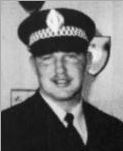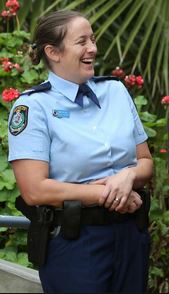John EMERTON
John EMERTON
New South Wales Police Force
Regd. # ?
Sergeant from 1884 – 1887
Retired about June 1887 on a Pension
Stations: Sydney ( 15 years )
Goulburn ( 15 years – 10 as Lock Up Keeper )
Served four years in the City of London Police Force
Born?
Served with NSW Police Force for 30 years
Died 23 August 1887
Illness – Inflammation of the lungs
Funeral 26 August 1887
Buried Wesleyan Cemetery, Goulburn
Death of Sergeant Emerton.
Residents of Goulburn will learn with regret of the death of Sergeant Emerton, which took place at a quarter to six o’clock on Tuesday evening last. Sergeant Emerton arrived in the colony in 1857, being sent out by the Imperial Government with a number of other constables, among them being Mr. Read, now the Governor of Darlinghurst Gaol. Previous to his departure Sergeant Emerton had served for four years in the City of London Police Force. His connection with the New South Wales force extended over a period of 30 years, some fifteen of which were spent in and about Sydney and fifteen in Goulburn. He served in all grades of the service, from ordinary constable to sergeant. On the death of Constable Lloyd he was appointed lookup-keeper here, and retained the office for ten years. His appointment as sergeant was made three years ago, and three months since he retired on a pension. The deceased was a great favorite in Goulburn, his kindness of heart and his consideration to those who were for the time being in his charge being well known. He was also a good officer, working well both in a subordinate rank and as an officer. As lookup-keeper he always treated well-behaved prisoners even generously. Deceased had been ailing for two months from a complication of diseases, the principal cause of death being inflammation of the lungs. He leaves behind him a widow and three sons and three daughters. The remains will be interred to-morrow with Masonic honors.
Goulburn Evening Penny Post Thursday 25 August 1887 page 4 of 4
[divider_dotted]
Funeral of Sergeant Emerton. –
The remains of the late Sergeant Emerton were interred in the Wesleyan cemetery yesterday afternoon. The procession left the late residence of the deceased in Bourke street shortly after three o’clock, and comprised fifteen members of the Belmore Lodge of the Protestant Alliance Friendly Society, twenty-five members of the masonic fraternity, both in craped regalia, fifteen vehicles, three horsemen, and about a dozen persons on foot.
At the gate of the cemetery the Rev. Canon D’Arcy-Irvine M.A. joined the procession. After reading the first part of the burial service the Rev. A. J. Webb gave a short address, saying that Sergeant Emerton was a man whose long record attested that he had done his duty like a Briton and a Christian ; and that he had furthermore striven to do his duty with as much regard as possible for the feelings of others : a combination desirable in all men, but especially valuable in a police officer.
Men who were unswerving in their conscientious adherence to what was incumbent on them and also considerate to their follow-men would earn the respect of the citizens and leave a good name behind them when their bodies mingled with the dust. The deceased had never been ashamed of Christianity, and there was reason to believe he died a Christian.
The Rev. Canon D’Arcy-Irvine then read the remainder of the service.
After this the freemasons drew round the grave and the touching burial ceremony of the masonic body was performed, each member throwing a sprig of thyme on the coffin, with the closing words “so mote it be.”
Goulburn Herald Saturday 27 August 1887 page 4 of 8
[divider_dotted]
CORONER’S INQUEST.
An inquest was hold at the Rose and Crown Hotel, Clifford street, Goulburn, on Thursday evening, before the District Coroner ( Mr A. M. Betts ), touching the death of Elizabeth Emerton, widow of the late Sergeant Emerton, which took place at her residence, Bourke-street, on the previous afternoon.
One of the jurors summoned, William Clarke, failed to attend, and Constable Clemsha proved service of the summons upon him, when the gentleman referred to said he would not attend.
The Coroner said he was bound to mark the absence of the juror referred to, and that he was empowered to inflict a fine of £5 ; but he did not propose resorting to that extreme course, although he did not consider he would be doing his duty by inflicting a smaller fine than £2.
That amount was accordingly placed against Mr. Clarke.
After the coroner and jury had viewed the body of the deceased and Mr J. E. P. Walker been chosen foreman of the jury,
Peter Hume Gentle deposed: I am a legally qualified medical practitioner, and am the Government medical officer for Goulburn and the district ; I have made a post-mortem examination of the deceased, but found no marks of external violence upon her ; I then examined the brain, and found a large quantity of serum on the surface of the brain, and a large clot of blood on the base of the brain ; I believe extravasion of blood and rupture of a blood vessel on the basis of the brain to have been the cause of the deceased’s death, which symptoms are known as apoplexy ; I did not examine the other organs ; the deceased had frequently been under my treatment for bilious attacks and indigestion ; I had attended deceased professionally for a number of years.
Annie Emerton, daughter of the deceased, deposed : The body that has just been viewed by the jury is that of my late mother, Elizabeth Emerton ; she was the widow of the late Sergeant John Emerton, who died on the 23rd August last ; my mother was 53 years of age, and has left six children, mostly grown up ; my mother went to Sydney for a week, and returned last Tuesday afternoon ; she appeared to be enjoying good health when she came home ; yesterday, about half past 12 o’clock, she complained of a slight head-ache ; I told her she had better go and lie down for a while ; she did so, while I went and cooked the dinner ; I had the dinner ready, and then told my sister Maud to go and tell mother to come to dinner ; my sister called out to me from mother’s room, and said that mother was sick ; I immediately went into the room, when I saw my mother lying on the bed ; she tried to speak to me, but could not ; I directly afterwards dispatched my sister for the doctor, and then for Mrs. Mawson, who lives next door ; mother never spoke afterwards, and was very black in the face when I went into the room ; she seemed to be unconscious ; Dr. McKillop arrived about five minutes afterwards, but before he came my mother was dead ; she died without speaking, and did not appear to get any better after I went into the room ; mother seemed very well up to 12.30, and made no complaint of being ill until then ; about an hour elapsed from the time mother first complained until she died ; I did not think when she first complained that there was anything serious enough to send for the doctor.
To the foreman : Mother seemed to be very much distressed and low-spirited of late, on account of my father’s death.
Elizabeth Mawson deposed : I am the wife of Benjamin Mawson ; I have known the deceased ever since she came to Goulburn, but not to speak to her until she came to live next door to me, about three years ago ; I had not seen her since she returned from Sydney until I was called in yesterday at a quarter-past 1 o’clock ; when I went into deceased’s room I found her lying on her back on the bed ; she was working her hands and frothing at the mouth ; she tried to say something, but I could not understand what it was ; she was quite purple in the face, and appeared to be quite insensible ; I stayed with deceased till her death ; her daughter asked me what I thought was the matter ; I said I thought deceased was in a fit, and advised her to send for a doctor directly ; deceased died in about a quarter of an hour afterwards ; I think deceased had been dead about five minutes when Dr McKillop came.
Mr Betts summed up the evidence, pointing out that the deceased was quite well until 12 30 on the previous day and that no one could say exactly when Mrs Emerton was first seized with illness. He showed that Dr. Gentle’s evidence was very clear, and thought that if all the doctors in the universe had been present the deceased’s death could not have been averted.
The jury returned a verdict in accordance with the medical testimony.
INSPECTOR OF WEIGHTS AND MEASURE.
The Police-Magistrate mentioned that Sergeant Henry Oliver had been appointed inspector of weights and measures for the police district of Goulburn in the room of the late Sergeant Emerton.
Goulburn Evening Penny Post Tuesday 15 November 1887 page 4 of 4

